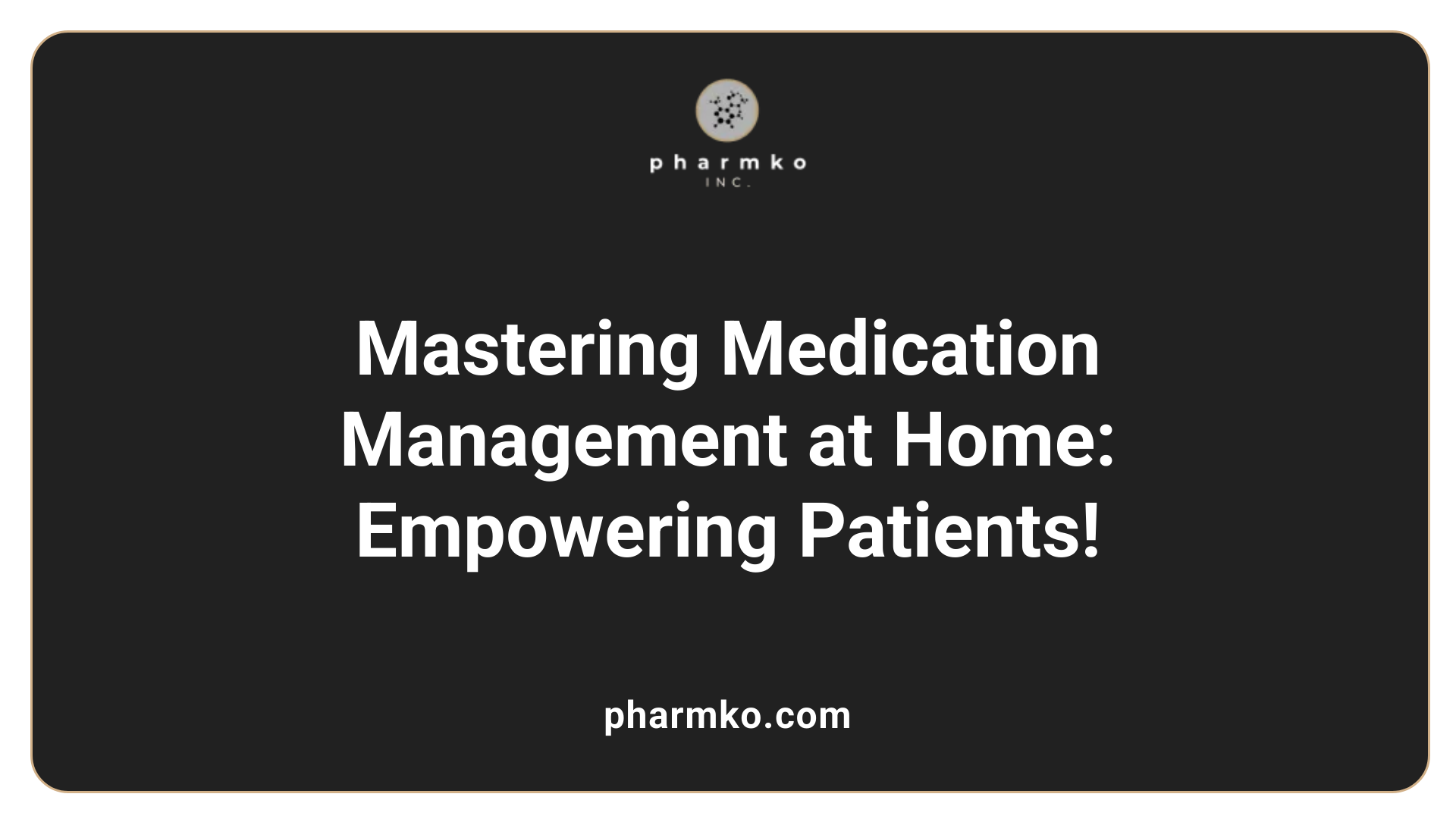Role of specialty meds in home care
Introduction
The landscape of home healthcare has been significantly transformed with the integration of specialty medications. Designed to address complex and chronic conditions, these medications necessitate a comprehensive approach involving specialty pharmacies, skilled healthcare providers, and robust management frameworks. This article explores the critical role of specialty medications in enhancing patient outcomes, the unique services offered by specialty pharmacies, and the collaborative efforts required to administer these therapies in home settings.
Understanding Specialty Drugs and Their Uses

What are specialty drugs used for?
Specialty drugs are specifically formulated to treat complex or rare chronic conditions. Conditions like cancer, rheumatoid arthritis, hemophilia, HIV, psoriasis, inflammatory bowel disease, and hepatitis C require these advanced therapies.
These medications often come with high costs—typically exceeding $1,000 for a 30-day supply—and necessitate special handling, monitoring, and administration. Patients receiving these drugs usually require a high level of care and support to manage side effects and ensure adherence to prescribed regimens.
The growing significance of specialty medications in the healthcare landscape is underscored by their financial impact; by 2015, specialty drugs accounted for one-third of all drug spending in the United States. The rise of specialty pharmacies has been pivotal in managing the distribution and care of these complex medications, which further emphasizes the need for specialized treatment plans tailored to individual patient needs.
Complex conditions treated with specialty medications
The role of specialty drugs extends to managing various complex conditions, which include but are not limited to:
- Cancer : Specialty medications like targeted therapies and immunotherapies are vital for many cancer treatments.
- Rheumatoid arthritis : Biologics often serve as frontline treatments for managing chronic inflammatory processes.
- HIV/AIDS : Antiretroviral therapies help manage and maintain life health.
- Hemophilia : Specialty medications ensure patients maintain the necessary clotting factors for safe blood coagulation.
These conditions often involve considerable challenges, highlighting the importance of effective management through specialty drugs.
Economic impact of specialty medications
The economic implications of specialty medications cannot be overlooked. As specialized treatments represent a significant financial investment for healthcare systems, addressing insurance coverage, affordability, and patient navigation becomes essential.
While these drugs promise improved health outcomes, they also contribute substantially to overall drug expenditure. The integration of specialty pharmacies into health systems not only streamlines patient access to necessary medications but also plays a vital role in managing care effectively, reducing the need for costly hospital visits, and improving quality of life for patients with complex health requirements. The coordination between specialty pharmacists and healthcare providers ensures that patients receive continuous support while optimizing treatment efficacy, which ultimately correlates with better clinical outcomes.
Specialty Pharmacies: Bridging Gaps in Patient Care

What is the role of a specialty pharmacy?
The role of a specialty pharmacy is pivotal in managing the dispensing and support of high-cost, complex medications used to treat serious chronic conditions such as cancer, multiple sclerosis, and HIV/AIDS. These pharmacies not only provide medications but also offer extensive patient management services.
What services do specialty pharmacies provide?
- Clinical Education : Specialty pharmacies provide in-depth training for patients about their medications, covering important topics such as dosage, side effects, and storage practices.
- Coordination with Healthcare Teams : They work closely with doctors, nurses, and other healthcare providers to ensure seamless communication and care continuity.
- Insurance Assistance : Specialty pharmacies assist patients in navigating insurance complexities, managing processes like prior authorization, and ensuring coverage for their prescribed treatments.
- Financial Assistance Programs : Many specialty pharmacies offer programs to help alleviate the financial burden on patients, such as copay cards and support for navigating financial aid resources.
Why are these services important?
Specialty pharmacies are critical in facilitating patient access to necessary treatments, enhancing adherence, and optimizing clinical outcomes. This comprehensive support helps patients manage their conditions effectively, improving their health outcomes and overall experience with the healthcare system.
| Service Type | Details for Patient Care | Impact |
|---|---|---|
| Clinical Education | In-depth training on medication use, administration, and safety | Supports informed patient decisions |
| Insurance Coordination | Navigating prior authorizations and coverage | Enhances access to medications |
| Financial Assistance | Programs to mitigate drug costs | Reduces financial burden on patients |
| Coordination with Providers | Ensures effective communication among healthcare teams | Improves care continuity and outcomes |
The Intersection of Specialty Pharmacy and Home Infusion Services

What is the difference between specialty pharmacy and home infusion?
The main difference between specialty pharmacy and home infusion lies in their focus and delivery methods. Specialty pharmacies coordinate care and provide medications for patients with complex and chronic conditions, such as cancer or immunological disorders. Their goal is to ensure that patients have access to necessary medications while receiving additional support for medication management.
In contrast, home infusion is a method of administering treatments through a needle or catheter directly in a patient's home. This delivery method is especially beneficial for patients who cannot tolerate oral medications, offering a more convenient solution for ongoing treatment.
Many specialty pharmacies, including Amber Specialty Pharmacy , also provide home infusion services. This integration ensures that patients receive both necessary medications and infusion treatments in the comfort of their own home. Although both specialty pharmacies and home infusion services share the common goal of enhancing patient outcomes, they operate in slightly different areas of patient care.
Integration of infusion services in specialty care
The collaboration between specialty pharmacies and home infusion services enhances the quality of patient care. Specialty pharmacies not only distribute high-cost specialty medications but also coordinate with healthcare providers for home infusion, ensuring comprehensive patient support.
Through continuous communication among the care team, these pharmacies handle insurance coordination, side effect management, and patient education. This cohesive approach leads to improved adherence to treatment plans, ultimately translating to better clinical outcomes for patients with complex health needs.
In summary, integrating infusion services within specialty pharmacy frameworks exemplifies a commitment to providing holistic patient care that addresses both medication access and the administration method, which is crucial for patients requiring specialized treatments.
Comprehensive Medication Management in Home Settings

What is medication management in home health?
Medication management in home health encompasses a thorough array of services designed to ensure that patients adhere to their prescribed medication regimens. Registered nurses play a pivotal role in this process by assisting patients in developing medication schedules tailored to their specific needs. They review medication regimens regularly, considering factors such as effectiveness and potential side effects.
An essential part of this management involves educating patients about their medications. Nurses emphasize the correct dosage, administration frequency, and potential side effects, fostering a deep understanding that empowers patients during their recovery. This educational aspect is particularly vital in cases of complex chronic conditions, where patients might be on multiple specialty medications.
Additionally, effective collaboration with healthcare providers is crucial. Nurses not only monitor changes in the patient's health status but can also adjust medications as needed, facilitating a dynamic approach to treatment that prioritizes safety and effectiveness. For example, they check medication labels and maintain an updated list of medications to prevent errors.
What protocols must be followed for medication preparation and administration?
In a home care environment, strict protocols are paramount to ensure the safe and effective administration of medications. Nurses conduct thorough assessments during the initial patient evaluation, which includes verifying that patients have the necessary medications and equipment. This foundational step helps identify potential barriers that may impede treatment, such as unsafe home environments or inadequate support systems.
Moreover, nurses must adhere to established processes and standards of practice, particularly concerning specialty medications that require special handling. Continuous monitoring throughout therapy helps nurses detect side effects or adverse reactions early, enabling them to take prompt action in emergencies. Post-visit documentation is also critical, as it ensures continuity of care and consistent communication with specialty pharmacies and physicians.
How do nurses handle emergency decision-making in home care?
Emergency decision-making is a vital component of home care nursing. Nurses must be prepared to make immediate medical decisions if a patient experiences a complication or an emergency arises. Their training equips them to stay calm and act decisively based on established protocols and their clinical knowledge.
For instance, in situations where a patient exhibits concerning symptoms, nurses assess the situation quickly, using their judgment to determine whether it necessitates immediate intervention or contacting medical professionals. Their ability to navigate these high-stakes moments highlights the critical importance of skilled nursing in maintaining patient safety and comfort in home environments. Overall, the integration of specialty pharmacists and nurses within the healthcare team enhances the comprehensive medication management process, ensuring patients receive the highest standard of care.
Legal and Ethical Considerations in Specialty Medications Home Care
Liability and First-Dose Administration
In home care settings, nurses face legal implications when administering specialty medications, particularly concerning first doses. The reluctance to provide these initial doses stems from concerns about liability, making it crucial for nurses to be aware of their legal responsibilities. Proper training and adherence to established protocols can mitigate risks and enhance patient safety.
Ethical Challenges in Home Healthcare
Nurses often encounter ethical complexities in home care, especially when patients may struggle with substance use. This raises significant questions about the appropriateness of continuing treatment amidst safety concerns. The ethical obligation to provide care must be balanced against the potential risks to both the patient and nurse, necessitating critical decision-making.
Standardization and Documentation
Another challenge lies in the lack of standardization in home health services. Ensuring thorough documentation post-visit is essential for maintaining continuity of care and enhancing communication between specialty pharmacies and medical teams. This comprehensive approach helps address gaps in care and promotes patient welfare as they navigate complex treatment regimens.
Insurance Implications and Patient Access to Specialty Meds

Insurance coverage for home-administered medications
Access to specialty medications for home care often hinges on understanding insurance coverage. When patients self-administer these medications, insurance typically covers them under the pharmacy benefit. Conversely, if a healthcare professional administers the drugs, they may fall under the medical benefit, such as Medicare Part B for infused medications. This distinction is crucial as it affects how patients secure access to their necessary treatments.
Role of specialty pharmacies in navigating insurance complexities
Specialty pharmacies play a pivotal role in guiding patients through the often-complex insurance landscape. They assist in obtaining prior authorizations and offer financial counseling to address high co-pays. By liaising with insurance companies, specialty pharmacies ensure that patients can access their medications without significant financial burden, enhancing adherence to treatment protocols.
Impact of reimbursement options on access to care
Reimbursement models can significantly impact a patient's ability to receive specialty medications. The structure of these models—whether covering medications under pharmacy or medical benefits—affects how patients engage with their treatment plans. Proper coordination of patient care and efficient communication between specialty pharmacies and healthcare providers is essential to minimize barriers and ensure continuous access to necessary medications.
Conclusion
As home healthcare continues to evolve, the role of specialty medications and the pharmacies that dispense them becomes increasingly vital. From administering complex therapies to managing insurance challenges, specialty services are integral to providing comprehensive, value-based care. The collaborative efforts of specialized healthcare teams ensure that patients receive not only their medications but also the necessary support and education to manage their conditions effectively at home. As such, these efforts not only improve patient outcomes but also significantly contribute to the efficiency and sustainability of home healthcare services.
References
- Providing Specialty Therapy in the Home - Pharmacy Times
- Health-system specialty pharmacy role and outcomes - PubMed
- Hands-on Care in the Home Setting - Pharmacy Times
- [PDF] What's So Special About Specialty Pharmacy?
- Homecare Highlight: Nurses Provide Specialty Infusions in Patient ...
- [PDF] ASHP Guidelines on Home Infusion Pharmacy Services
- Specialty Pharmacy Services: Preparing for a New Era in Health ...
- What a Specialty Pharmacy Can Do for You - WebMD













